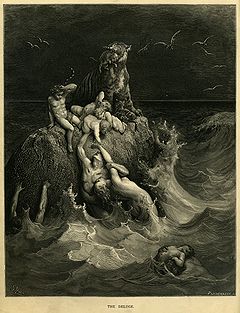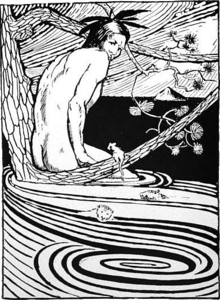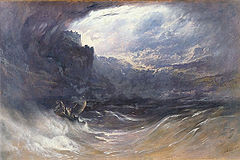- Flood myth
-
"Great Flood" redirects here. For other uses, see Great Flood (disambiguation).
 "The Deluge", frontispiece to Gustave Doré's illustrated edition of the Bible. Based on the story of Noah's Ark, this shows humans and a tiger doomed by the flood futilely attempting to save their children and cubs.
"The Deluge", frontispiece to Gustave Doré's illustrated edition of the Bible. Based on the story of Noah's Ark, this shows humans and a tiger doomed by the flood futilely attempting to save their children and cubs.
 Nanabozho in Ojibwe flood story from an illustration by R.C. Armour, in his book North American Indian Fairy Tales, Folklore and Legends, (1905).
Nanabozho in Ojibwe flood story from an illustration by R.C. Armour, in his book North American Indian Fairy Tales, Folklore and Legends, (1905).
A flood myth or deluge myth is a mythical or religious story of a great flood sent by a deity or deities to destroy civilization as an act of divine retribution. It is a theme widespread among many cultures, though it is perhaps best known in modern times through the biblical and Quranic account of Noah's Ark, the foundational myths of the Quiché and Mayas, through Deucalion in Greek mythology, the Utnapishtim in the Epic of Gilgamesh or the Hindu puranic story of Manu which has some very strong parallels with the story of Noah.
Parallels are often drawn between the flood waters of these myths and the primeval waters found in some creation myths since the flood waters are seen to cleanse humanity in preparation for rebirth. Most flood myths also contain a culture hero who strives to ensure this rebirth.[1]
Contents
Origin of flood myths
Adrienne Mayor's The First Fossil Hunters and Fossil Legends of the First Americans promoted the hypothesis that flood stories were inspired by ancient observations of seashells and fish fossils inland and on mountains. The ancient Greeks, Egyptians, Romans, and Chinese all wrote about finding such remains in these locations, and the Greeks hypothesized that Earth had been covered by water several times, noting seashells and fish fossils found on mountain tops as evidence. Native Americans also expressed this belief in their early encounters with Europeans, though they had not written it down previously.[citation needed] However, Leonardo da Vinci postulated that an immediate deluge could not have caused the neatly ordered strata he found in the Italian Apennines.
Some geologists believe that quite dramatic, unusually great flooding of rivers in the distant past might have influenced the legends. Also episodes of massive flooding of short duration of ocean coastal areas have been caused by tsunamis. One of the latest, and quite controversial, hypotheses of long term flooding is the Ryan-Pitman Theory, which argues for a catastrophic deluge about 5600 BC from the Mediterranean Sea into the Black Sea. This has been the subject of considerable discussion, and a news article from National Geographic News in February 2009 reported that the flooding might have been "quite mild".[2]
There also has been speculation that a large tsunami in the Mediterranean Sea caused by the Thera eruption, dated about 1630–1600 BC geologically, was the historical basis for folklore that evolved into the Deucalion myth. Although the tsunami hit the South Aegean Sea and Crete it did not affect cities in the mainland of Greece, such as Mycenae, Athens, and Thebes, which continued to prosper, indicating that it had a local rather than a regionwide effect.[3]
Another theory is that a meteor or comet crashed into the Indian Ocean around 3000–2800 BC, created the 30 kilometres (19 mi) undersea Burckle Crater, and generated a giant tsunami that flooded coastal lands.[4]
It has been postulated that the deluge myth may be based on a sudden rise in sea levels caused by the rapid draining of prehistoric Lake Agassiz at the end of the last Ice Age, about 8,400 years ago.[5][6][7]
The great deluge finds mention in Hindu mythology texts like the Satapatha Brahmana,[8] where in the Matsya Avatar (Fish incarnation) of the Hindu deity Vishnu takes place to save the pious and the first man, Manu.[9][10][11]
See also
- Antediluvian
- Atlantis
- Atrahasis
- Aztlán
- Black Sea deluge theory
- Cantref Gwaelod
- Deluge (prehistoric)
- Gilgamesh flood myth
- Great Flood (China)
- Immanuel Velikovsky
- Lemuria
- List of flood myths
- Matsya
- Noah's Ark
- Viracocha
- Ys
- Ziusudra
References
- ^ "Flood", The Oxford Companion to World Mythology. David Leeming. Oxford University Press, 2004. Oxford Reference Online. Oxford University Press. 17 September 2010 http://www.oxfordreference.com/views/ENTRY.html?subview=Main&entry=t208.e567
- ^ "'Noah's Flood' Not Rooted in Reality, After All?" National Geographic News, February 6, 2009.
- ^ Castleden, Rodney (2001) "Atlantis Destroyed" (Routledge).
- ^ Scott Carney (November 7, 2007). "Did a comet cause the great flood?". Discover Magazine. http://discovermagazine.com/2007/nov/did-a-comet-cause-the-great-flood. Retrieved 17 September 2010.
- ^ Sarah Hoyle (November 18, 2007). "Noah's flood kick-started European farming". University of Exeter. http://www.eurekalert.org/pub_releases/2007-11/uoe-fk111507.php. Retrieved 17 September 2010.
- ^ Early days among the Cheyanne & Arapahoe Indians by John H. Seger, page 135 ISBN 0-8061-1533-5
- ^ Book of the Hopi by Frank Waters, page 18 ISBN 0-14-004527-9
- ^ The great flood -- Hindu style (Satapatha Brahmana)
- ^ Matsya Britannica.com
- ^ Klaus K. Klostermaier (2007). A Survey of Hinduism. SUNY Press. p. 97. ISBN 0791470822. http://books.google.co.in/books?id=E_6-JbUiHB4C&pg=PA97&lpg=PA97&dq=the+great+flood+in+Hinduism#v=onepage&q=the%20great%20flood%20in%20Hinduism&f=false.
- ^ Sunil Sehgal (1999). Encyclopaedia of Hinduism: T-Z, Volume 5. Sarup & Sons. p. 401. ISBN 8176250643. http://books.google.co.in/books?id=zWG64bgtf3sC&pg=PA401&dq=Noah%27s+Ark+in+Hinduism#v=onepage&q=Noah%27s%20Ark%20in%20Hinduism&f=false.
Other
- Alan Dundes (editor), The Flood Myth, University of California Press, Berkeley, 1988. ISBN 0-520-05973-5 / 0520059735
- Lloyd R. Bailey. Noah, the Person and the Story, University of South Carolina Press, 1989, ISBN 0-87249-637-6
- Anthony Faulkes, (transl.) (1987). Edda (Snorri Sturluson). Everyman. ISBN 0-460-87616-3.
- John Greenway (editor), The Primitive Reader, Folkways, 1965
- G. Grey, Polynesian Mythology, Illustrated edition, reprinted 1976. (Whitcombe and Tombs: Christchurch), 1956.
- W. G. Lambert and A. R. Millard, Atrahasis: The Babylonian Story of the Flood, Eisenbrauns, 1999, ISBN 1-57506-039-6.
- W. B. Masse, 2007. The Archaeology and Anthropology of Quaternary Period Cosmic Impact, in Bobrowsky, P., and Rickman, H., eds., Comet/Asteroid Impacts and Human Society: An Interdisciplinary Approach: Berlin, Springer Press, p. 25-70.
- A.W. Reed, Treasury of Maori Folklore (A.H. & A.W. Reed:Wellington), 1963.
- Anaru Reedy (translator), Nga Korero a Pita Kapiti: The Teachings of Pita Kapiti. Canterbury University Press: Christchurch, 1997.
External links
- The Great Flood All texts (Eridu Genesis, Atrahasis, Gilgamesh, Bible, Berossus), commentary, and a table with parallels
- Mark Isaak (1996-2002). "Flood stories from around the world". http://home.earthlink.net/~misaak/floods.htm. Retrieved 2007-06-27.
- "Mirror from September 2002". http://www.talkorigins.org/faqs/flood-myths.html. Retrieved 2007-06-27.
- Ballard & The Black Sea National Geographic
- Flood Legends from Around the World
- The Flood myth as preserved by the Uru-Muratos of Bolivia's Altiplano on YouTube
- Talkorigins.org
- The BIAMI Legends
- The Genesis Flood and Human History
- The Two Flood Stories; A Comparison of the J and P Accounts Henry E. Neufeld
- Travels of Noah - book written in 1601 telling of the travel of Noah's and the re-population of Europe
- Why Does Nearly Every Culture Have a Tradition of a Global Flood John D. Morris,Ph.D.
- A possible source of the Noah's Flood story Critical review by the Ontario Consultants for Religious Tolerance
- An Anthropologist Looks at the Judeo-Christian Scriptures
- Choctaw Flood Legends Index USA
- Comparison of Babylonian and Noahic Flood Stories
- Flood Stories details of many accounts from around the world
- Flood Stories From Around the World Mark Isaak
- Incan Legends of the Great Flood
- Language Grouping for Flood Stories Mark Isaak
- Morgana's Observatory:Universal Myths Flood Myths Part One
- Flood Myths Part Two
- Myth - Flood N.S. Gill
- Native American Indian Lore: The Great Flood
- The Epic of Gilgamesh Tablet XI - The Story of the Flood
- The Eridu Genesis - The Sumerian Noah
- The Flood, Greek Mythology Link
- The Myth of Noah's Flood Joseph Francis Alward
- The Story of Atrahasis
- A Comparison of Narrative Elements in Ancient Mesopotamian Creation-Flood Stories William H. Shea
- A Statistical Analysis of Flood Legends James E. Strickling CRSQ Abstracts, Volume 9, Number 3
- Aboriginal Flood Legend
- Australian Aboriginal Flood Stories
- Flood Legendsearthage.org
- Flood Legends
- Flood Stories - Can They Be Ignored? by Roth, A. A.
- Flood Traditions by Noahs Ark Zoo Farm
- Flood Traditions of the World Arthur C. Custance
- Genesis and ancient Near Eastern stories of Creation and the Flood
- Grand Canyon Legend
- Noah’s Flood and the Gilgamesh Epic by John Sarfati
- Panning for Traces of the Flood by Kyle Butt, M.A.
Categories:- Comparative mythology
- Flood myths
- Fertile Crescent
- Megafloods
- Mesopotamian mythology
- Monomyths
- Water and religion
Wikimedia Foundation. 2010.

